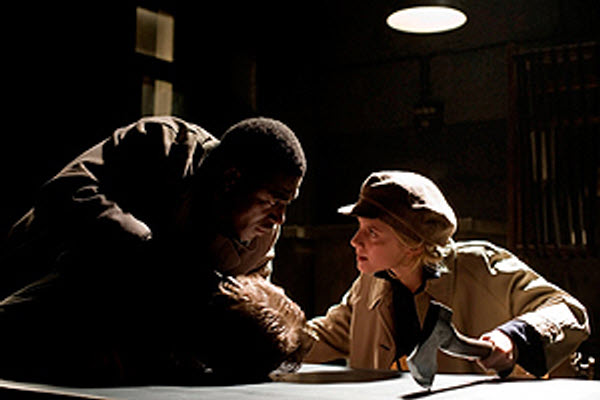Inglourious Basterds (2009) 
“A basterd’s work is never done.”

Director: Quentin Tarantino,
Cast: Brad Pitt, Diane Kruger, Eli Roth
Synopsis: In Nazi-occupied France during World War II, a plan to assassinate Nazi leaders by a group of Jewish U.S. soldiers coincides with a theatre owner’s vengeful plans for the same.
WARNING! – This review contains SPOILERS!
I’m not a great fan of Quentin Tarantino, and I’m baffled by his almost God-like status in the movie business. Studios want to finance him, actors want to work with him, and moviegoers can’t wait to see his movies. How, I wonder, can so many people be so wrong? Tarantino makes movies the way any other movie geek presented with a film crew and a vast budget would make movies. He basically recreates scenes from other movies that he thinks are cool. Granted, he has a certain talent for dialogue — although it’s noticeably less unique when removed from the milieu of hip-talking gangster types — and he has mastered the technical side of moviemaking, but when you get right down to it, he doesn’t really have that many original ideas. And as for the deliberate mis-spelling of Inglourious Basterds, he can come over all enigmatic about the meaning behind it — “Here’s the thing,” he declared. “I’m never going to explain that. You do an artistic flourish like that, and to explain it would just take the piss out of it and invalidate the whole stroke in the first place.” — but all that does is convince me that it has no meaning other than Quentin thought it would look cool on the posters.
Having said all that, I’ve got to admit that, after the bloated, self-indulgent awfulness of Death Proof and the Kill Bill movies, Inglourious Basterds is actually surprisingly good. Although Tarantino chief influence remains all that has come before in the cinema, with Inglourious Basterds he at least confines these influences to mimicking the style of certain genres rather than simply copying particular scenes. The most obvious genre to which Tarantino pays homage is the Spaghetti Western which is particularly evident in the opening scene in which he uses stylised dialogue, and which is similar to the opening scenes of one of Leone’s classics.
Inglourious Basterds is split into chapters, most of which contain at least one lengthy scene. An hour into the movie, and there’s only been a handful of scenes. Tarantino is very good at building the tension during these sequences, particularly the scene in which three undercover allied soldiers are scrutinised by a suspicious SS Officer, and this use of tension seems to condense time, making the film seem much shorter than it actually is.
The plot revolves around Shosanna (Melanie Laurent), a young Jewess whose family is executed by German soldiers under the command of Colonel Hans Landa (Christoph Waltz). Landa is the role that put Waltz on the map, and you’ve got to say that he plays the part superbly, combining cold intelligence with an impish — if grotesque — sense of humour. Like a cat toying with a mouse, Landa deliberately prolongs his interrogation of a French farmer, knowing that a family of Jews is hiding within earshot beneath the floorboards. Shosanna is the only survivor — thanks to an uncustomary moment of leniency on Landa’s part.
The story moves forward to focus for a while on a Dirty Dozen style unit of Jews, led by Lt. Aldo Raine (Brad Pitt), who are airlifted into Nazi Germany with the simple instruction to kill as many Nazis as they possibly can. Raine looks like Hemingway around the time he was aiding the peasants in the Spanish Civil War, but Pitt plays him as a man from the deep South. It’s an odd performance from Pitt, and not entirely successful. He seems overly aware of his unsuitability for the role, and juts out his chin as if in an attempt to disguise his movie star looks. His unit are the Basterds of the title, and they’re a brutal, unforgiving lot, scalping any Nazi they kill or carving a swastika into the forehead of any soldier they allow to survive. It doesn’t exactly make them an endearing bunch to either us or the Germans, and the parallels — intentional or otherwise — with Nazi treatment of Jews are a little too close for comfort.
The stories of Shosanna and Raines slowly converge, finally coming together at the premiere of a movie about a Nazi war hero at Shosanna’s cinema which is attended by most of the Nazi bigwigs, including Hitler. That their mission is a success gives notice of just how tongue-in-cheek Tarantino’s approach to his material is. It’s Quentin playing with his toys again, only this time his antics are at least diverting enough to keep onlookers entertained.
httpv://www.youtube.com/watch?v=KnrRy6kSFF0
